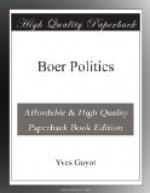Mr. Chamberlain replies in his despatch of September 22nd, in which he clearly states the attitude of the British Government. It has no desire to interfere in any way with the independence of the South African Republic. It has not asserted any other rights of interference in the internal affairs of the South African Republic than those derived from the Conventions, or “which belong to every neighbouring Government for the protection of its subjects and of its adjoining possessions. But, by the action of the Government of the South African Republic, who have in their Note of May 9th, asserted the right of the Republic to be a Sovereign International State, it has been compelled to repudiate any such claim.” He repeats that the Franchise would enable the Uitlanders to procure just treatment for themselves, and concludes by saying: “the refusal of the South African Republic to entertain the offer thus made coming, as it does, at the end of nearly four months of negotiations, and of five years of agitation, makes it useless to further pursue a discussion on the lines hitherto followed, and Her Majesty’s Government are now compelled to consider the situation afresh and to formulate their own proposals for a final settlement.”
The Transvaal Government has accused Sir Alfred Milner of not keeping his word. Two despatches, one from Mr. Chamberlain, September 16th, the other from Sir Alfred Milner, September 20th, refute this allegation.
3.—The Ultimatum.
These two despatches received no reply. On September 28th, the Volksraad of the Orange Free State proclaimed that it would “faithfully and honorably fulfil its obligations towards the South African Republic, in accordance with the alliance between the two States, whatever might be the consequences.” Mr. Steyn, the President, gave an account of the negotiations from his point of view. The Cape presented a petition drawn up by fifty-eight members of the Cape Parliament, five of whom were Ministers and had adopted Mr. Steyn’s view; on the other side, fifty-three members of both Chambers passed a resolution approving the policy of the British Government. President Steyn complained of troops being sent to Africa. Later events have proved whether these complaints were justifiable. On September 29th, the Netherlands Railway stated that communication with Natal was interrupted. The telegraph wires were cut. On October 2nd, President Krueger, in adjourning the Volksraad sine die, stated that “War is inevitable,” and on October 9th, the Government of the South African Republic handed an Ultimatum to the British Agent at Pretoria.
The Ultimatum demanded Arbitration on all subjects; the withdrawal of British troops; the re-embarkation of British troops landed after June 1st; troops on the high seas not be landed.




